PENGELOLAAN LIMBAH BANTEN SEBAGAI SUMBER ENERGI TERBARUKAN DENGAN TEKNOLOGI RDF BERKUALITAS TINGGI
Keywords:
waste banten, renewable energy, Refuse Derived Fuel (RDF)Abstract
Hindu religious ceremonies in Bali in their implementation produce a lot of banten waste. Banteng waste is difficult to decompose as compost. Utilization of waste as fuel or Refuse Derived Fuel (RDF) is one option in overcoming the problem of waste waste in Banten in Bali. There are various processes that can be applied to produce RDF, including through biodrying. Biodrying is one part of Mechanical-Biological Treatment technology which aims to reduce the water content of waste by utilizing the heat generated from the activity of microorganisms in degrading organic matter so that an increase in calorific value is expected. RDF refers to the separation of the fraction which has a high calorific value from the separation process. RDF production is designed to convert the combustible fraction of municipal solid waste into fuel. In the process of making RDF, the residual waste from the former offerings goes through various stages of heating and printing. The resulting RDF is of high quality and has been tested with a yield of 4.000 kcal/kg. The finished RDF can be used as fuel, one of which has been used as boiler fuel in a laundry business in Badung Bali. The use of RDF can replace non-renewable energy sources that have started to run out and are replaced with new renewable energy with the concept of waste to energy.
Downloads
References
Finstein M.S., Miller, F.C., and Strom, F. 2016. Waste Treatment Composting As A Controlled System. Journal Biotechnology, 8(2), 366-396.
Haryanti, S., Evi, G, Mahendra, W. 2020. Pengelolaan Lingkungan Hidup di Kota Yogyakarta. Jurnal Bioeksperimen, 6(1), 60-68.
Kasztelan, Armand. 2017. Green Growth, Green Economy and Sustainable Development: Terminological and Relational Discourse. Prague Economic Papers, 26, 487-499.
Rania, Mutiara Fadila, I Gede Eka Lesmana, and Eka Maulana. 2019. Analisis Potensi Refuse Derived Fuel (RDF) Dari Sampah Pada Tempat Pembuangan Akhir (TPA) Di Kabupaten Tegal Sebagai Bahan Bakar Incinerator Pirolisis. Jurnal Ilmiah Teknik Mesin, 13(1), 51–59.
Sarc, R, K E Lorber. 2013. Production, Quality and Quality Assurance of Refuse Derived Fuels (RDFs). International Journal Waste Management 33(9): 185-194.
Setiyo, Y, Hadi, K. P, Subroto, M. A, Yuwono, A. S. 2017. Pengembangan Model Simulasi Proses Pengomposan Sampah Organik Perkotaan. Journal Forum Penelitian, 3(1), 11-18).
Sriwijaya, Sayid Bahri. 2016. Analisa Potensi Sampah Di TPSA Cilowong Sebagai Bahan Baku Refuse Derived Fuel (RDF). Jurnal Teknobiz, 6(3), 174-182.
Sugianti, I.G.A.N., Trihadiningrum, Y. 2018. Pengelolaan Sampah Di Kawasan Pura Besakih, Kecamatan Rendang, Kabupaten Karangasem Dengan Sistem TPST (Tempat Pengolahan Sampah Terpadu). Prosiding Seminar Nasional Manajemen Teknologi VII, 25-68.
Yusgiantoro, Purnomo. 2016. Peraturan Menteri Energi Dan Sumber Daya Mineral Nomor : 047 Tahun 2006, 1-21.










